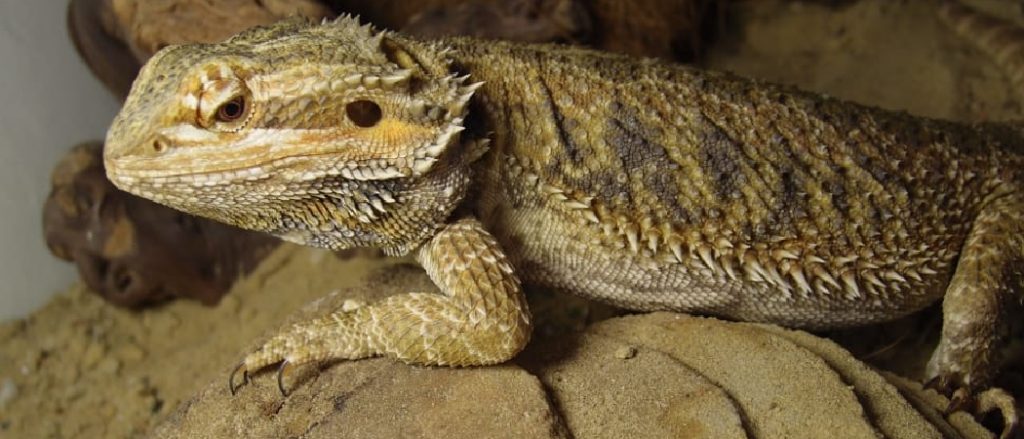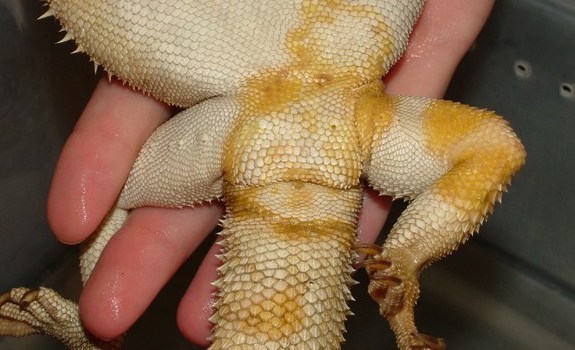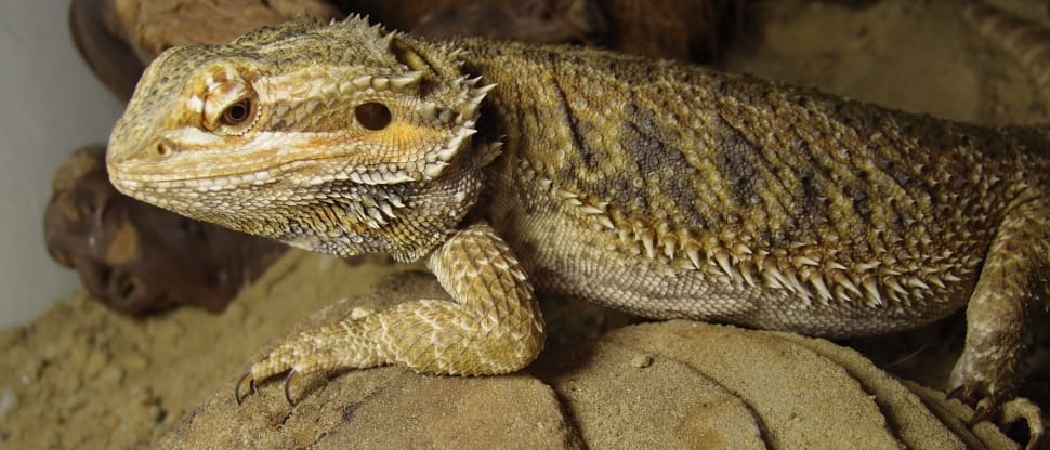If your bearded dragon is lethargic, has lost appetite, and has abnormal stool, it may be dying. Bearded dragons are popular reptile pets known for their unique appearance and docile nature.

However, as owners, it’s essential to keep a close eye on their health and well-being. Recognizing the signs of a dying bearded dragon is crucial in order to provide immediate care and potentially save their life. We will discuss the various indicators that may suggest your bearded dragon is in critical condition.
It’s important to remember that early intervention is key in these situations, so being attentive and observant can make all the difference for your beloved pet.

Credit: www.reddit.com
Signs Of Illness In Bearded Dragons
Be on the lookout for changes in appetite, lethargy, weight loss, and abnormal behavior, as these may indicate that your bearded dragon is in critical condition. It’s essential to seek immediate veterinary attention if you suspect your beloved pet is dying.
As a responsible bearded dragon owner, it’s important to be able to recognize the signs of illness in your pet. By being vigilant and observing any changes in their behavior, appetite, and physical appearance, you can catch any health issues early on and seek proper medical treatment. In this article, we will explore the key signs of illness that you should watch out for in your bearded dragon.
Changes In Appetite And Weight
One of the first indicators that something may be wrong with your bearded dragon is a change in their appetite and weight. Bearded dragons are typically voracious eaters, so a sudden decrease in appetite or complete loss of interest in food can signal an underlying health issue. In addition, weight loss or rapid weight gain should not be ignored, as these changes can indicate metabolic disorders, parasites, or organ failures.
If you notice that your bearded dragon is refusing to eat or displaying a significant decrease in their food intake, it’s time to take action. Monitor their weight by using a digital scale designed for reptiles. Keeping a regular record of their weight can provide valuable information for your veterinarian during a diagnosis. If you notice a substantial drop or gain in weight, it’s crucial to schedule a visit to the veterinarian specializing in reptile care.
Abnormal Behavior
Bearded dragons are known for their docile and friendly nature. Any sudden changes in their behavior can be indicative of an underlying health problem. If your normally active and curious bearded dragon becomes lethargic, agitated, or appears to be weak, it may be a cause for concern.
Other abnormal behaviors to watch out for include frequent hiding, lack of responsiveness to handling, twitching or jerking movements, excessive sleeping, or unusual aggressiveness. Pay attention to their interactions with you and their environment, as these changes in behavior can signal distress or pain. Seeking veterinary care is essential if you observe any concerning behavioral changes in your bearded dragon.
Physical Symptoms
Physical symptoms are the most visible signs of illness in bearded dragons. These can vary depending on the underlying health issue but may include:
- Discoloration or paleness of the skin or scales
- Swollen joints or limbs
- Difficulty breathing
- Discharge from the eyes, nose, or mouth
- Open sores, ulcers, or wounds
- Abnormal shedding or retained shed
- Lumps, bumps, or growths
If you notice any of these physical symptoms in your bearded dragon, it’s important not to ignore them. Prompt veterinary attention is necessary to diagnose and treat the underlying cause of these symptoms. Remember, early intervention can greatly improve the chances of a successful recovery.
Common Causes Of Illness In Bearded Dragons
As a responsible owner, it’s crucial to be aware of the common causes of illness in bearded dragons. Recognizing the signs of a sick bearded dragon is essential in order to provide timely care and potentially save their life. In this section, we will explore the various factors that can contribute to their deteriorating health.
Improper Husbandry
Environmental conditions play a pivotal role in the overall well-being of your bearded dragon. Failing to meet their specific requirements can greatly impact their health.
Improper husbandry encompasses several factors that should be carefully considered:
- Temperature: Bearded dragons require a temperature gradient in their enclosure to properly regulate their body temperature. Inadequate temperature levels can lead to lethargy, decreased appetite, and other health issues.
- Lighting: These reptiles are highly dependent on ultraviolet (UV) light to synthesize Vitamin D3, which is crucial for proper calcium metabolism. Inadequate exposure to UVB light can cause metabolic bone disease and weaken their immune system.
- Humidity: Bearded dragons need a specific humidity level to support their respiratory health. Insufficient humidity can lead to respiratory infections and difficulty shedding.
- Enclosure size: Inadequate space can cause stress, compromised immune response, and hinder their natural behaviors.
Inadequate Nutrition
Providing a balanced and nutritious diet is vital for the well-being of your bearded dragon. Inadequate nutrition can lead to various health issues and even contribute to their declining health.
Here are some key aspects to consider when it comes to their diet:
- Inadequate calcium: Calcium is essential for proper bone health in bearded dragons. A deficiency in calcium can lead to metabolic bone disease, resulting in weak and brittle bones.
- Incorrect calcium-phosphorus ratio: The calcium-to-phosphorus ratio needs to be balanced for optimum absorption. An imbalance in this ratio can impair calcium absorption and negatively impact their bone health.
- Poor variety: Bearded dragons require a diverse diet consisting of insects, vegetables, and fruits. Feeding them a monotonous diet can lead to nutrient deficiencies and weaken their immune system.
Infections And Diseases
Bearded dragons are susceptible to various infections and diseases, which can severely affect their health and, in some cases, be life-threatening.
Here are some of the common infections and diseases that can afflict bearded dragons:
- Respiratory infections: Respiratory infections are often caused by improper humidity levels, unsanitary conditions, or inadequate ventilation. Symptoms can include wheezing, nasal discharge, and labored breathing.
- Parasitic infections: Parasites, such as mites, ticks, or worms, can infest bearded dragons, leading to weight loss, decreased appetite, and general discomfort.
- Metabolic bone disease: This condition results from an imbalance in calcium and phosphorus levels, causing weakened bones, limb deformities, and muscle tremors.
Parasites
Parasitic infestations can be a common ailment in bearded dragons and should not be taken lightly. Recognizing and treating these parasites promptly is crucial for the health of your pet.
Here are some common parasites that can affect bearded dragons:
- Internal parasites: Internal parasites, such as pinworms or coccidia, can cause digestive issues, weight loss, and a weakened immune system.
- External parasites: External parasites, like mites or ticks, can cause irritation, skin lesions, and anemia if left untreated.
Regular veterinary check-ups, proper husbandry, a balanced diet, and good hygiene practices can greatly minimize the risk of illness in your bearded dragon. However, it is important to be aware of the potential causes of illness and take necessary precautions to ensure the overall well-being and longevity of your scaly friend.
Actions To Take If Your Bearded Dragon Is Dying
If you suspect your bearded dragon is dying, there are a few key signs to look out for. These include lethargy, loss of appetite, weight loss, and changes in behavior or appearance. It’s important to take immediate action by consulting a veterinarian who specializes in reptiles to provide the best care for your pet.
Actions to Take if Your Bearded Dragon is Dying When it comes to our beloved bearded dragons, it can be distressing to see them in poor health. If you suspect that your bearded dragon is dying, there are important actions you should take to ensure their well-being and comfort during this difficult time. By promptly seeking veterinary care, creating a comfortable environment, providing supportive care and medication, and monitoring their progress and quality of life, you can make a difference in their final days.
Seek Veterinary Care
The first and most crucial action to take if you believe your bearded dragon is dying is to seek immediate veterinary care. Professional help is essential in determining the cause of their declining health and understanding the best course of action to take. A reptile veterinarian will be able to assess your bearded dragon’s symptoms, perform tests if necessary, and provide guidance on how to manage their condition. Look for a veterinarian experienced in reptile care, as they will have the knowledge and expertise to provide the best possible care for your bearded dragon.
Create A Comfortable Environment
In addition to veterinary care, creating a comfortable environment for your bearded dragon can help improve their quality of life during their final days. Ensure their tank is set up with appropriate heating and lighting to maintain a suitable temperature gradient. Consider using soft bedding, such as fleece or towels, to provide a comfortable surface for them to rest on. Avoid handling them excessively to minimize stress, and provide hiding spots where they can retreat if needed. By making their environment as comfortable as possible, you can help alleviate any discomfort they may be experiencing.
Provide Supportive Care And Medication
Supportive care and medication can play a crucial role in managing your bearded dragon’s condition and improving their comfort. Your veterinarian may prescribe medications to alleviate pain, reduce inflammation, or address any specific health concerns. Follow their instructions carefully and administer the medication as directed. Additionally, offering supportive care such as hand feeding or providing easy-to-digest foods can tempt them to eat if their appetite has declined. It’s important to consult your veterinarian before making any changes to their diet or providing supplemental support.
Monitor Progress And Quality Of Life
Throughout this difficult time, it’s important to monitor your bearded dragon’s progress and quality of life closely. Keep a record of any improvements or deterioration in their condition, including changes in appetite, mobility, and behavior. Regularly assess their overall well-being and make note of any signs of pain or distress. Consider weighing them periodically to track any changes in weight. By consistently monitoring their condition, you can make informed decisions alongside your veterinarian regarding their treatment plan and quality of life. Remember, it can be challenging to see your bearded dragon in such a condition, but by taking these actions, you are providing them with necessary care and support during their final days. Seek veterinary care, create a comfortable environment, provide supportive care and medication, and closely monitor their progress and quality of life to make their final moments as comfortable as possible.

Credit: reptile.guide

Credit: www.facebook.com
Frequently Asked Questions On How To Tell If Your Bearded Dragon Is Dying
How Do You Know When A Beardie Is Dying?
A dying beardie may show signs such as loss of appetite, lethargy, weight loss, weak limbs, sunken eyes, and difficulty breathing. Monitor their behavior closely and consult a veterinarian if you notice any concerning symptoms.
How Do You Take Care Of A Dying Bearded Dragon?
To care for a dying bearded dragon, provide a warm, quiet, and comfortable environment. Keep them well-hydrated and offer easy-to-digest food like baby food or moistened insects. Consult a vet for possible medication and monitor their behavior and bowel movements.
What’s The Average Age Of Death For A Bearded Dragon?
The average age of death for a bearded dragon is around 8 to 12 years. They can live longer with proper care and a healthy diet.
How Do I Know If My Bearded Dragon Is In Distress?
Signs of distress in a bearded dragon include lack of appetite, weight loss, lethargy, abnormal bowel movements, and changes in skin color or texture. Monitor their behavior and consult a veterinarian if you notice any of these symptoms to ensure their well-being.
Conclusion
In a nutshell, keeping a close eye on your bearded dragon’s health is crucial for early detection of any potential issues. By paying attention to changes in behavior, appetite, appearance, and physical symptoms, you can determine if your bearded dragon is experiencing health problems or possibly dying.
Remember, consulting a veterinarian is always the best course of action for a proper diagnosis and treatment plan. Taking proactive steps now can greatly improve the chances of your beloved pet’s well-being and provide them with the care they deserve.


